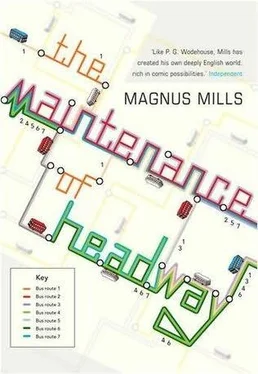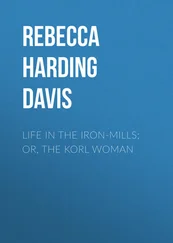I arrived at the common and saw Hastings standing outside the underground station, where peace had returned after the chaos of the morning rush. How a place could change in so short a while! All was quiet now, yet a mere two hours ago the pavement where he stood had been seething with people. It was the same every day. From seven o’clock until nine, swarms of them emerged from the escalators in a continual surge. Woe betide a bus that happened to arrive just after a train had come in. Within seconds it would fall victim to the sort of feeding frenzy usually associated with the jungle: a grazing beast laid low by predators. Even when the bus was full the people kept trying to get on, and the besieged driver could do little to relieve the situation. Strictly speaking there existed an imaginary line in front of which passengers weren’t supposed to stand. This was difficult to enforce, however, when people simply kept piling onto the vehicle. In the past I’d tried making announcements in which I’d ask them ‘not to stand forward of the imaginary line’, but they never took any notice. The only solution was to close the doors and hope nobody got squashed. Sometimes I shuddered when I thought of the interfering politicians who were trying to get the doors removed from buses. Politicians liked nothing more than to be photographed on the open platform of a bus, preferably in the company of a smiling conductor. They assumed the pictures would win them votes and, therefore, they opposed doors on buses. The impracticality meant nothing to them.
I was pondering all this when I suddenly noticed Hastings was flagging me down. I pulled up and glanced at my watch: I was one minute early. Hastings came to my window.
“Swing her round the arch for us, will you?” he said. “Then can you come straight back and run her into the garage?”
Hastings belonged to the old school of manners and continued to refer to buses as ‘her’ and ‘she’. Furthermore, he always gave instructions in the form of a question, so that it appeared as if you were doing him a good turn. Unlike Greeves, though, he wasn’t one for providing explanations to drivers, so I had no idea why he’d curtailed my journey. All the same it was quite a result. It meant I would be on my way back in about an hour’s time! Hastings signed my log card and I changed my destination blind before proceeding joyously towards the arch. The usual mid-morning quiet spell had now begun in earnest. I crossed over the bridge amidst a light flurry of traffic, collecting unhurried passengers here and there as gradually I made my way north. It was a very pleasant ride: even the lights were obligingly green. At one point I passed Kenny Barton bringing a bus the other way, and as he went by he gave me a very odd signal. He sort of pointed behind him with his thumb, at the same time shaking his head in mock despair. He’d gone before I was able to decipher precisely what he meant, but I didn’t have to wait long to find out. Skirting the corner of the royal park, I suddenly came upon one of our buses not a hundred yards ahead of me. Even at this distance I knew who was driving. I could tell by the body language of the bus. It was Mrs Barker!
Mrs Barker had been based at our garage since time immemorial, though nobody could quite work out how she had lasted so long. Put simply, she did not seem to realise that she was part of a coordinated operation, which ran buses at specific times, calling at designated stops and charging predetermined fares. Instead she tried to provide a sort of ‘social service’, allowing people to get on and off where they pleased and pay according to their means. She had been known to remain at a bus stop for as long as ten minutes while she worked out a ‘special rate’ for someone, or waited while they went back for the dog they’d forgotten, or even cashed a cheque for them. Actually it didn’t make any difference whether it was a proper bus stop or not. She halted at all sorts of places to pick passengers up and drop them off again: zebra crossings, T-junctions, traffic lights (especially green ones). All the people she helped in this way thought she was ‘an absolute treasure’ and undoubtedly she did have a heart of gold. I had often noticed, however, that just as many people fled her bus if they saw another one going in the same direction. This, I presumed, was due to her ‘ultra-defensive’ style of driving. She steered well clear of other vehicles and always yielded to them at roundabouts and intersections, even if she had the right of way. Not only was she wary of oncoming traffic, which made her doubly hesitant, but she also kept well clear of the kerb, so that queues of irate motorists built up behind her. True, she had never been involved in an accident. Even so, I suspect she would have witnessed dozens if she’d ever bothered to look in her mirror. Despite her best efforts to serve the public, Mrs Barker caused nightmares for the officials. She ran late from the very outset of her journey, with the result that they had to make compensatory adjustments to other buses.
Today was clearly no exception. As I watched her brake lights come on, go off, come on and go off again, I decided I had better overtake her. The alternative would have been to maintain strict headway and stay eight minutes behind, but then it would have taken forever to reach the arch. Mrs Barker was best left to her own devices so I passed her at the first opportunity. As I did so I took note of her running number. This told me she should have been four buses ahead of mine in the sequence. Which explained why Hastings had curtailed me. Mrs Barker was supposed to be coming back the other way by now, but instead he’d directed me to turn round at the arch and cover the southbound section. Meanwhile, she would continue her painstaking odyssey towards the cross.
All this ‘adjusting’ and ‘curtailing’ and similar tinkering by the officials came about due to the so-called ‘service requirements’ laid down by the Board of Transport. These dictated the minimum number of buses per hour on any particular route in each direction, thereby providing a viable ‘through’ service with other connecting routes. Officials were expected to juggle buses to make them conform to this master plan, while at the same time trying to ensure the maintenance of headway. Yet because they only had a finite supply of vehicles, they were obliged to curtail certain journeys in favour of others. No wonder the travelling public despaired. The idea of curtailing bus journeys in order to provide a better bus service defied logic, but, needless to say, the Board of Transport had a logic all of its own. How else could it accommodate drivers like Jason and Mrs Barker under equal terms? They were totally incompatible: Jason could complete a trip to the cross in half the time it took Mrs Barker. Such evidence alone exposed the maintenance of headway as a false idol. Indeed, back in the dark ages, when buses were first invented, there was an altogether different ruling maxim: ‘the bus will always get through’. In those days, every vehicle travelled from one end of the route to the other, no matter how long it took. The only buses available were the ‘old heavies’: no power steering, no sprung suspension, and, originally, no windscreen. Nevertheless, they plied back and forth through hail and highwater, undeterred by adverse traffic conditions; and curtailments were unheard of.
This, of course, was the ‘pure’ form of public transport advocated by Edward. He argued ceaselessly that the maintenance of headway was unattainable and should therefore be abandoned. In its place he suggested an organic system where each bus operated at its own speed until a perfect service developed. Perfection, he conceded, could take forever to achieve. The existing arrangement, by contrast, had imperfection built in from the start. Essentially, the job of a bus driver was to hold the bus back (but not quite as much as Mrs Barker did).
Читать дальше












